Organizational Behaviour Analysis and Team Development Report
VerifiedAdded on 2023/01/19
|16
|5624
|97
Report
AI Summary
This report examines the organizational behaviour of Everyday Holiday, an event management company, focusing on the interplay of culture, politics, and power and their impact on workforce performance and motivation. It analyzes Everyday Holiday's organizational culture, identifying it as predominantly task-oriented, and discusses the influence of workplace politics and power dynamics, particularly reward power, on employee behaviour. The report then delves into motivational theories, including content (Maslow's hierarchy) and process (Skinner's reinforcement) theories, and explores their application in enhancing employee motivation and achieving company objectives. Furthermore, the report applies Belbin and Tuckman's team development models to assess team effectiveness and addresses challenges faced by team leaders. Finally, it analyses different philosophies of organizational behaviour, offering recommendations for improving employee performance and overall organizational success.
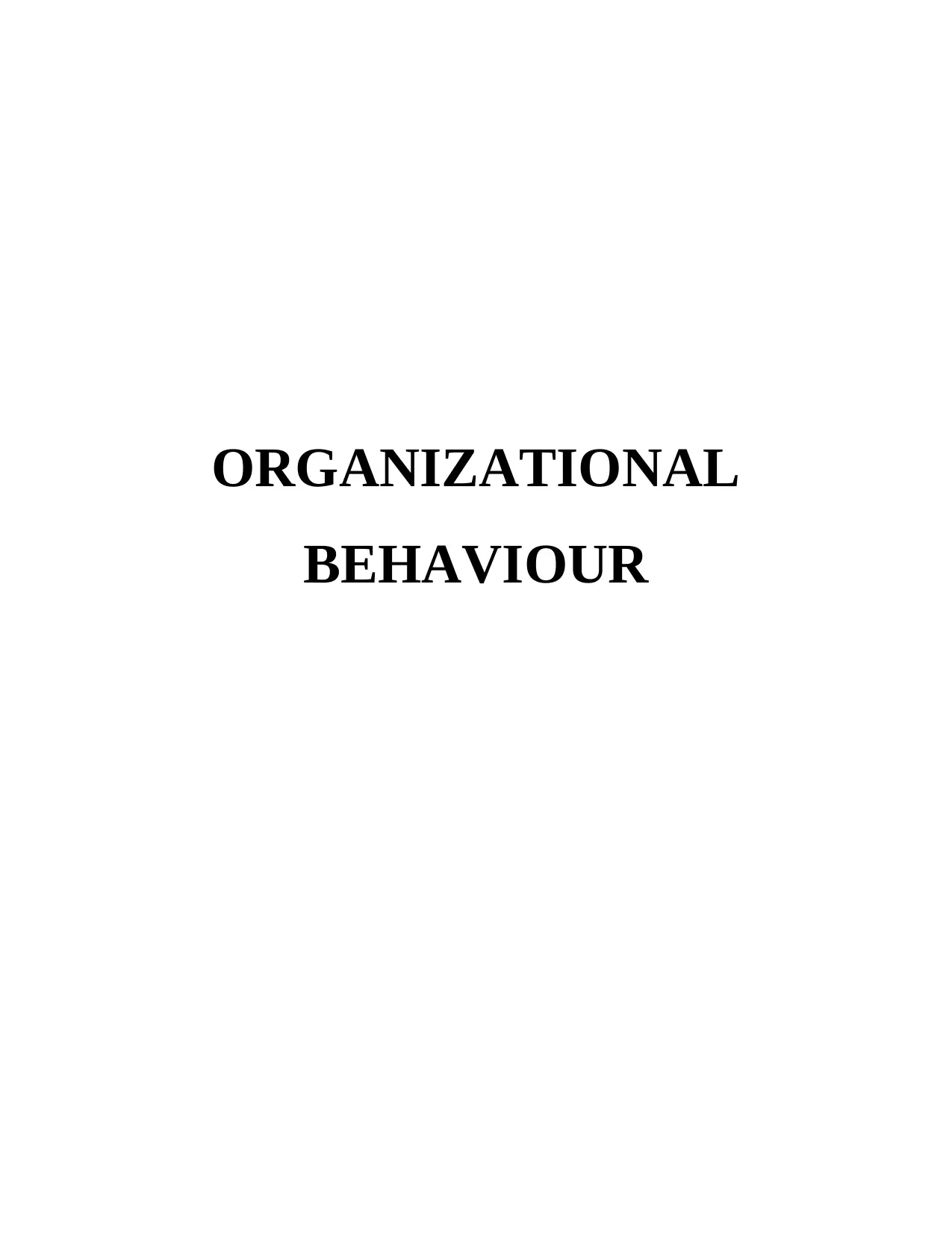
ORGANIZATIONAL
BEHAVIOUR
BEHAVIOUR
Paraphrase This Document
Need a fresh take? Get an instant paraphrase of this document with our AI Paraphraser
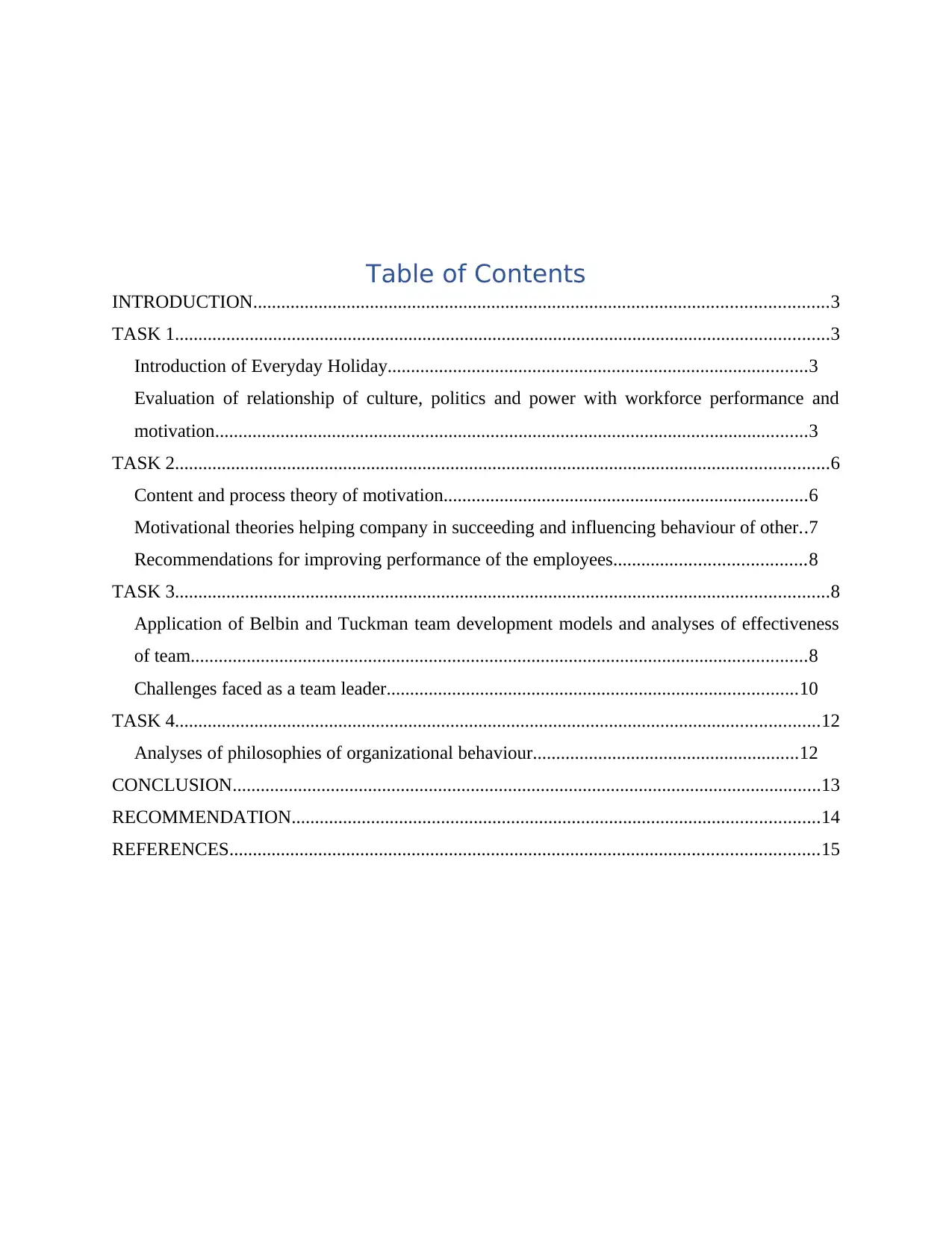
Table of Contents
INTRODUCTION...........................................................................................................................3
TASK 1............................................................................................................................................3
Introduction of Everyday Holiday..........................................................................................3
Evaluation of relationship of culture, politics and power with workforce performance and
motivation...............................................................................................................................3
TASK 2............................................................................................................................................6
Content and process theory of motivation..............................................................................6
Motivational theories helping company in succeeding and influencing behaviour of other..7
Recommendations for improving performance of the employees.........................................8
TASK 3............................................................................................................................................8
Application of Belbin and Tuckman team development models and analyses of effectiveness
of team....................................................................................................................................8
Challenges faced as a team leader........................................................................................10
TASK 4..........................................................................................................................................12
Analyses of philosophies of organizational behaviour.........................................................12
CONCLUSION..............................................................................................................................13
RECOMMENDATION.................................................................................................................14
REFERENCES..............................................................................................................................15
INTRODUCTION...........................................................................................................................3
TASK 1............................................................................................................................................3
Introduction of Everyday Holiday..........................................................................................3
Evaluation of relationship of culture, politics and power with workforce performance and
motivation...............................................................................................................................3
TASK 2............................................................................................................................................6
Content and process theory of motivation..............................................................................6
Motivational theories helping company in succeeding and influencing behaviour of other..7
Recommendations for improving performance of the employees.........................................8
TASK 3............................................................................................................................................8
Application of Belbin and Tuckman team development models and analyses of effectiveness
of team....................................................................................................................................8
Challenges faced as a team leader........................................................................................10
TASK 4..........................................................................................................................................12
Analyses of philosophies of organizational behaviour.........................................................12
CONCLUSION..............................................................................................................................13
RECOMMENDATION.................................................................................................................14
REFERENCES..............................................................................................................................15
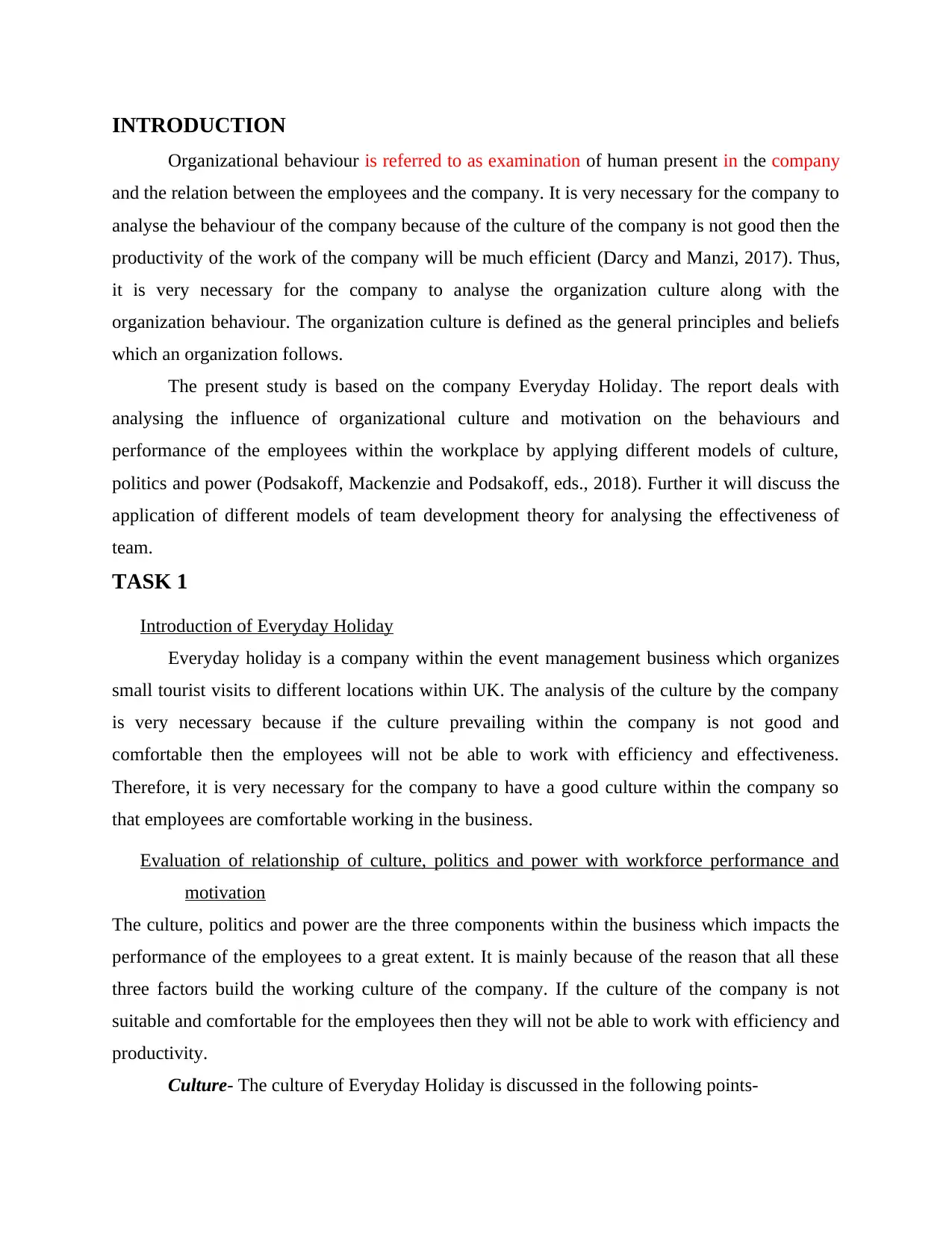
INTRODUCTION
Organizational behaviour is referred to as examination of human present in the company
and the relation between the employees and the company. It is very necessary for the company to
analyse the behaviour of the company because of the culture of the company is not good then the
productivity of the work of the company will be much efficient (Darcy and Manzi, 2017). Thus,
it is very necessary for the company to analyse the organization culture along with the
organization behaviour. The organization culture is defined as the general principles and beliefs
which an organization follows.
The present study is based on the company Everyday Holiday. The report deals with
analysing the influence of organizational culture and motivation on the behaviours and
performance of the employees within the workplace by applying different models of culture,
politics and power (Podsakoff, Mackenzie and Podsakoff, eds., 2018). Further it will discuss the
application of different models of team development theory for analysing the effectiveness of
team.
TASK 1
Introduction of Everyday Holiday
Everyday holiday is a company within the event management business which organizes
small tourist visits to different locations within UK. The analysis of the culture by the company
is very necessary because if the culture prevailing within the company is not good and
comfortable then the employees will not be able to work with efficiency and effectiveness.
Therefore, it is very necessary for the company to have a good culture within the company so
that employees are comfortable working in the business.
Evaluation of relationship of culture, politics and power with workforce performance and
motivation
The culture, politics and power are the three components within the business which impacts the
performance of the employees to a great extent. It is mainly because of the reason that all these
three factors build the working culture of the company. If the culture of the company is not
suitable and comfortable for the employees then they will not be able to work with efficiency and
productivity.
Culture- The culture of Everyday Holiday is discussed in the following points-
Organizational behaviour is referred to as examination of human present in the company
and the relation between the employees and the company. It is very necessary for the company to
analyse the behaviour of the company because of the culture of the company is not good then the
productivity of the work of the company will be much efficient (Darcy and Manzi, 2017). Thus,
it is very necessary for the company to analyse the organization culture along with the
organization behaviour. The organization culture is defined as the general principles and beliefs
which an organization follows.
The present study is based on the company Everyday Holiday. The report deals with
analysing the influence of organizational culture and motivation on the behaviours and
performance of the employees within the workplace by applying different models of culture,
politics and power (Podsakoff, Mackenzie and Podsakoff, eds., 2018). Further it will discuss the
application of different models of team development theory for analysing the effectiveness of
team.
TASK 1
Introduction of Everyday Holiday
Everyday holiday is a company within the event management business which organizes
small tourist visits to different locations within UK. The analysis of the culture by the company
is very necessary because if the culture prevailing within the company is not good and
comfortable then the employees will not be able to work with efficiency and effectiveness.
Therefore, it is very necessary for the company to have a good culture within the company so
that employees are comfortable working in the business.
Evaluation of relationship of culture, politics and power with workforce performance and
motivation
The culture, politics and power are the three components within the business which impacts the
performance of the employees to a great extent. It is mainly because of the reason that all these
three factors build the working culture of the company. If the culture of the company is not
suitable and comfortable for the employees then they will not be able to work with efficiency and
productivity.
Culture- The culture of Everyday Holiday is discussed in the following points-
⊘ This is a preview!⊘
Do you want full access?
Subscribe today to unlock all pages.

Trusted by 1+ million students worldwide
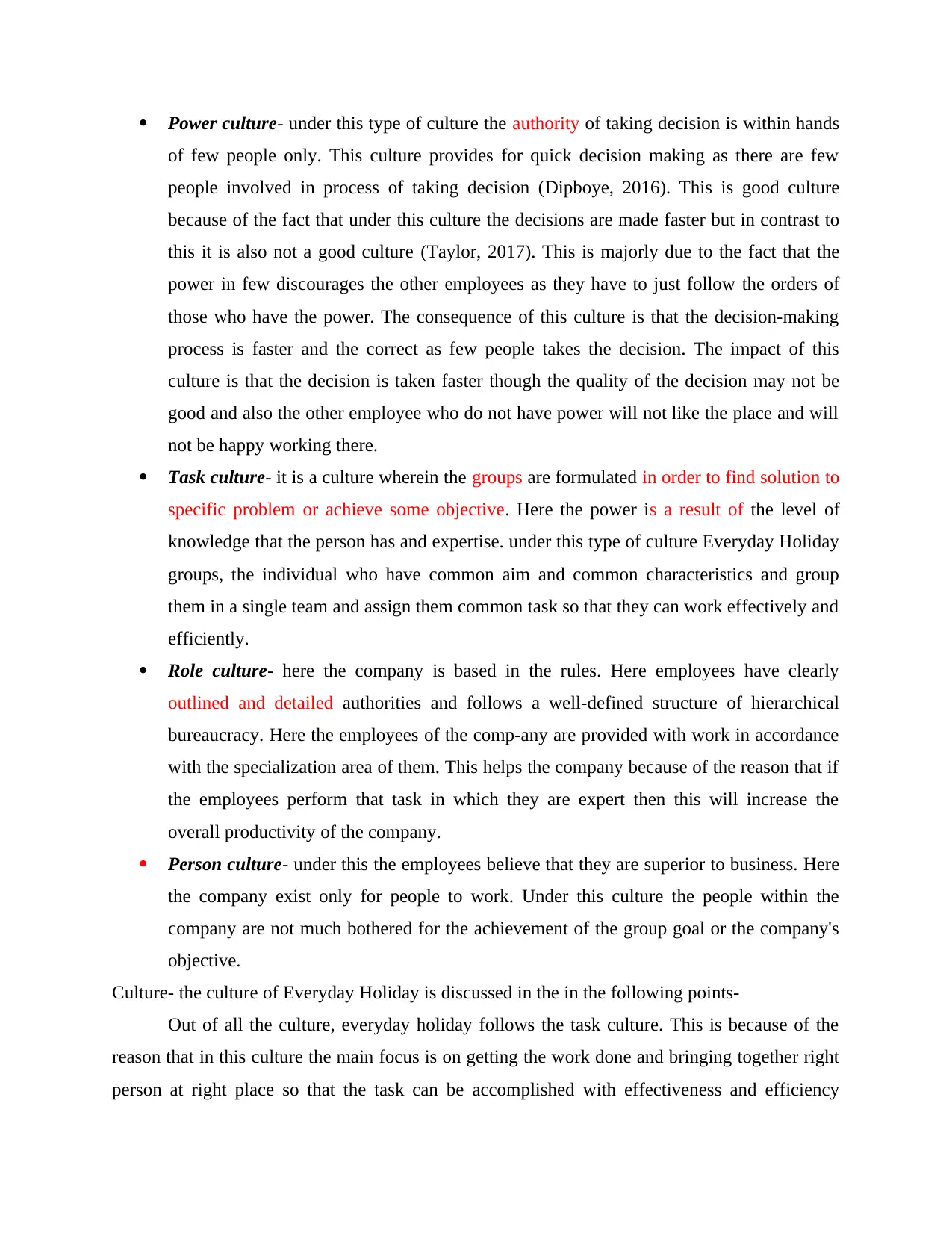
Power culture- under this type of culture the authority of taking decision is within hands
of few people only. This culture provides for quick decision making as there are few
people involved in process of taking decision (Dipboye, 2016). This is good culture
because of the fact that under this culture the decisions are made faster but in contrast to
this it is also not a good culture (Taylor, 2017). This is majorly due to the fact that the
power in few discourages the other employees as they have to just follow the orders of
those who have the power. The consequence of this culture is that the decision-making
process is faster and the correct as few people takes the decision. The impact of this
culture is that the decision is taken faster though the quality of the decision may not be
good and also the other employee who do not have power will not like the place and will
not be happy working there.
Task culture- it is a culture wherein the groups are formulated in order to find solution to
specific problem or achieve some objective. Here the power is a result of the level of
knowledge that the person has and expertise. under this type of culture Everyday Holiday
groups, the individual who have common aim and common characteristics and group
them in a single team and assign them common task so that they can work effectively and
efficiently.
Role culture- here the company is based in the rules. Here employees have clearly
outlined and detailed authorities and follows a well-defined structure of hierarchical
bureaucracy. Here the employees of the comp-any are provided with work in accordance
with the specialization area of them. This helps the company because of the reason that if
the employees perform that task in which they are expert then this will increase the
overall productivity of the company.
Person culture- under this the employees believe that they are superior to business. Here
the company exist only for people to work. Under this culture the people within the
company are not much bothered for the achievement of the group goal or the company's
objective.
Culture- the culture of Everyday Holiday is discussed in the in the following points-
Out of all the culture, everyday holiday follows the task culture. This is because of the
reason that in this culture the main focus is on getting the work done and bringing together right
person at right place so that the task can be accomplished with effectiveness and efficiency
of few people only. This culture provides for quick decision making as there are few
people involved in process of taking decision (Dipboye, 2016). This is good culture
because of the fact that under this culture the decisions are made faster but in contrast to
this it is also not a good culture (Taylor, 2017). This is majorly due to the fact that the
power in few discourages the other employees as they have to just follow the orders of
those who have the power. The consequence of this culture is that the decision-making
process is faster and the correct as few people takes the decision. The impact of this
culture is that the decision is taken faster though the quality of the decision may not be
good and also the other employee who do not have power will not like the place and will
not be happy working there.
Task culture- it is a culture wherein the groups are formulated in order to find solution to
specific problem or achieve some objective. Here the power is a result of the level of
knowledge that the person has and expertise. under this type of culture Everyday Holiday
groups, the individual who have common aim and common characteristics and group
them in a single team and assign them common task so that they can work effectively and
efficiently.
Role culture- here the company is based in the rules. Here employees have clearly
outlined and detailed authorities and follows a well-defined structure of hierarchical
bureaucracy. Here the employees of the comp-any are provided with work in accordance
with the specialization area of them. This helps the company because of the reason that if
the employees perform that task in which they are expert then this will increase the
overall productivity of the company.
Person culture- under this the employees believe that they are superior to business. Here
the company exist only for people to work. Under this culture the people within the
company are not much bothered for the achievement of the group goal or the company's
objective.
Culture- the culture of Everyday Holiday is discussed in the in the following points-
Out of all the culture, everyday holiday follows the task culture. This is because of the
reason that in this culture the main focus is on getting the work done and bringing together right
person at right place so that the task can be accomplished with effectiveness and efficiency
Paraphrase This Document
Need a fresh take? Get an instant paraphrase of this document with our AI Paraphraser
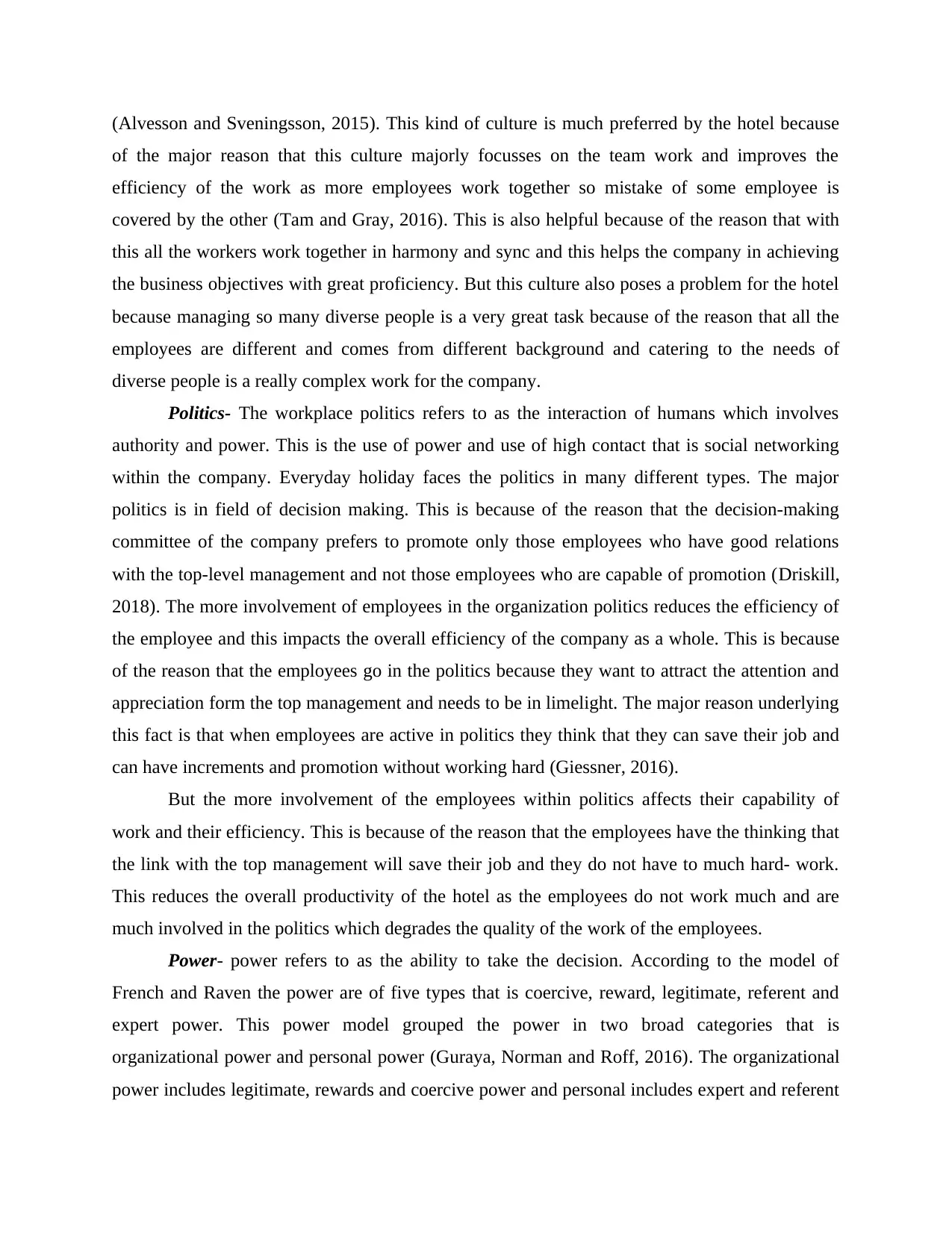
(Alvesson and Sveningsson, 2015). This kind of culture is much preferred by the hotel because
of the major reason that this culture majorly focusses on the team work and improves the
efficiency of the work as more employees work together so mistake of some employee is
covered by the other (Tam and Gray, 2016). This is also helpful because of the reason that with
this all the workers work together in harmony and sync and this helps the company in achieving
the business objectives with great proficiency. But this culture also poses a problem for the hotel
because managing so many diverse people is a very great task because of the reason that all the
employees are different and comes from different background and catering to the needs of
diverse people is a really complex work for the company.
Politics- The workplace politics refers to as the interaction of humans which involves
authority and power. This is the use of power and use of high contact that is social networking
within the company. Everyday holiday faces the politics in many different types. The major
politics is in field of decision making. This is because of the reason that the decision-making
committee of the company prefers to promote only those employees who have good relations
with the top-level management and not those employees who are capable of promotion (Driskill,
2018). The more involvement of employees in the organization politics reduces the efficiency of
the employee and this impacts the overall efficiency of the company as a whole. This is because
of the reason that the employees go in the politics because they want to attract the attention and
appreciation form the top management and needs to be in limelight. The major reason underlying
this fact is that when employees are active in politics they think that they can save their job and
can have increments and promotion without working hard (Giessner, 2016).
But the more involvement of the employees within politics affects their capability of
work and their efficiency. This is because of the reason that the employees have the thinking that
the link with the top management will save their job and they do not have to much hard- work.
This reduces the overall productivity of the hotel as the employees do not work much and are
much involved in the politics which degrades the quality of the work of the employees.
Power- power refers to as the ability to take the decision. According to the model of
French and Raven the power are of five types that is coercive, reward, legitimate, referent and
expert power. This power model grouped the power in two broad categories that is
organizational power and personal power (Guraya, Norman and Roff, 2016). The organizational
power includes legitimate, rewards and coercive power and personal includes expert and referent
of the major reason that this culture majorly focusses on the team work and improves the
efficiency of the work as more employees work together so mistake of some employee is
covered by the other (Tam and Gray, 2016). This is also helpful because of the reason that with
this all the workers work together in harmony and sync and this helps the company in achieving
the business objectives with great proficiency. But this culture also poses a problem for the hotel
because managing so many diverse people is a very great task because of the reason that all the
employees are different and comes from different background and catering to the needs of
diverse people is a really complex work for the company.
Politics- The workplace politics refers to as the interaction of humans which involves
authority and power. This is the use of power and use of high contact that is social networking
within the company. Everyday holiday faces the politics in many different types. The major
politics is in field of decision making. This is because of the reason that the decision-making
committee of the company prefers to promote only those employees who have good relations
with the top-level management and not those employees who are capable of promotion (Driskill,
2018). The more involvement of employees in the organization politics reduces the efficiency of
the employee and this impacts the overall efficiency of the company as a whole. This is because
of the reason that the employees go in the politics because they want to attract the attention and
appreciation form the top management and needs to be in limelight. The major reason underlying
this fact is that when employees are active in politics they think that they can save their job and
can have increments and promotion without working hard (Giessner, 2016).
But the more involvement of the employees within politics affects their capability of
work and their efficiency. This is because of the reason that the employees have the thinking that
the link with the top management will save their job and they do not have to much hard- work.
This reduces the overall productivity of the hotel as the employees do not work much and are
much involved in the politics which degrades the quality of the work of the employees.
Power- power refers to as the ability to take the decision. According to the model of
French and Raven the power are of five types that is coercive, reward, legitimate, referent and
expert power. This power model grouped the power in two broad categories that is
organizational power and personal power (Guraya, Norman and Roff, 2016). The organizational
power includes legitimate, rewards and coercive power and personal includes expert and referent
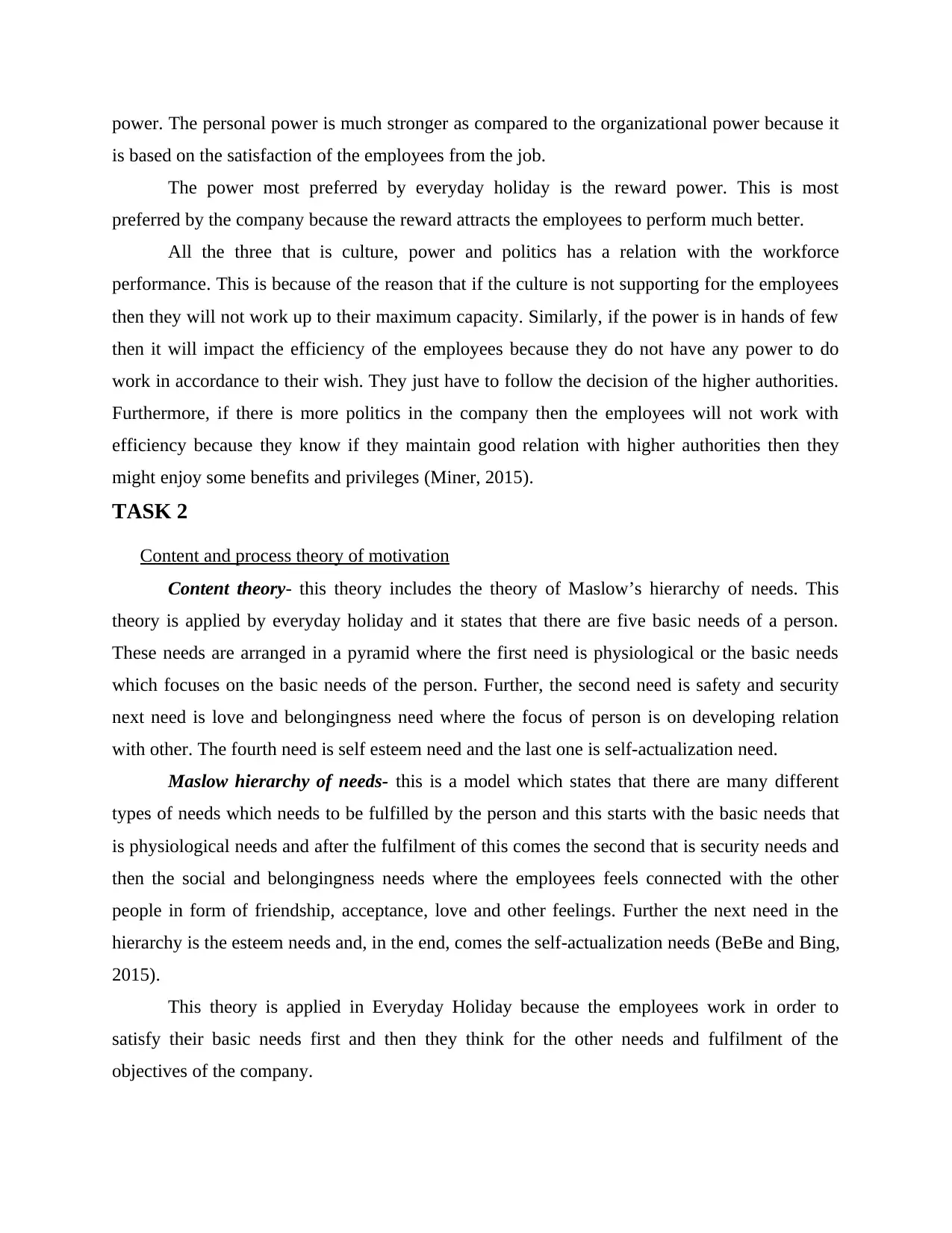
power. The personal power is much stronger as compared to the organizational power because it
is based on the satisfaction of the employees from the job.
The power most preferred by everyday holiday is the reward power. This is most
preferred by the company because the reward attracts the employees to perform much better.
All the three that is culture, power and politics has a relation with the workforce
performance. This is because of the reason that if the culture is not supporting for the employees
then they will not work up to their maximum capacity. Similarly, if the power is in hands of few
then it will impact the efficiency of the employees because they do not have any power to do
work in accordance to their wish. They just have to follow the decision of the higher authorities.
Furthermore, if there is more politics in the company then the employees will not work with
efficiency because they know if they maintain good relation with higher authorities then they
might enjoy some benefits and privileges (Miner, 2015).
TASK 2
Content and process theory of motivation
Content theory- this theory includes the theory of Maslow’s hierarchy of needs. This
theory is applied by everyday holiday and it states that there are five basic needs of a person.
These needs are arranged in a pyramid where the first need is physiological or the basic needs
which focuses on the basic needs of the person. Further, the second need is safety and security
next need is love and belongingness need where the focus of person is on developing relation
with other. The fourth need is self esteem need and the last one is self-actualization need.
Maslow hierarchy of needs- this is a model which states that there are many different
types of needs which needs to be fulfilled by the person and this starts with the basic needs that
is physiological needs and after the fulfilment of this comes the second that is security needs and
then the social and belongingness needs where the employees feels connected with the other
people in form of friendship, acceptance, love and other feelings. Further the next need in the
hierarchy is the esteem needs and, in the end, comes the self-actualization needs (BeBe and Bing,
2015).
This theory is applied in Everyday Holiday because the employees work in order to
satisfy their basic needs first and then they think for the other needs and fulfilment of the
objectives of the company.
is based on the satisfaction of the employees from the job.
The power most preferred by everyday holiday is the reward power. This is most
preferred by the company because the reward attracts the employees to perform much better.
All the three that is culture, power and politics has a relation with the workforce
performance. This is because of the reason that if the culture is not supporting for the employees
then they will not work up to their maximum capacity. Similarly, if the power is in hands of few
then it will impact the efficiency of the employees because they do not have any power to do
work in accordance to their wish. They just have to follow the decision of the higher authorities.
Furthermore, if there is more politics in the company then the employees will not work with
efficiency because they know if they maintain good relation with higher authorities then they
might enjoy some benefits and privileges (Miner, 2015).
TASK 2
Content and process theory of motivation
Content theory- this theory includes the theory of Maslow’s hierarchy of needs. This
theory is applied by everyday holiday and it states that there are five basic needs of a person.
These needs are arranged in a pyramid where the first need is physiological or the basic needs
which focuses on the basic needs of the person. Further, the second need is safety and security
next need is love and belongingness need where the focus of person is on developing relation
with other. The fourth need is self esteem need and the last one is self-actualization need.
Maslow hierarchy of needs- this is a model which states that there are many different
types of needs which needs to be fulfilled by the person and this starts with the basic needs that
is physiological needs and after the fulfilment of this comes the second that is security needs and
then the social and belongingness needs where the employees feels connected with the other
people in form of friendship, acceptance, love and other feelings. Further the next need in the
hierarchy is the esteem needs and, in the end, comes the self-actualization needs (BeBe and Bing,
2015).
This theory is applied in Everyday Holiday because the employees work in order to
satisfy their basic needs first and then they think for the other needs and fulfilment of the
objectives of the company.
⊘ This is a preview!⊘
Do you want full access?
Subscribe today to unlock all pages.

Trusted by 1+ million students worldwide
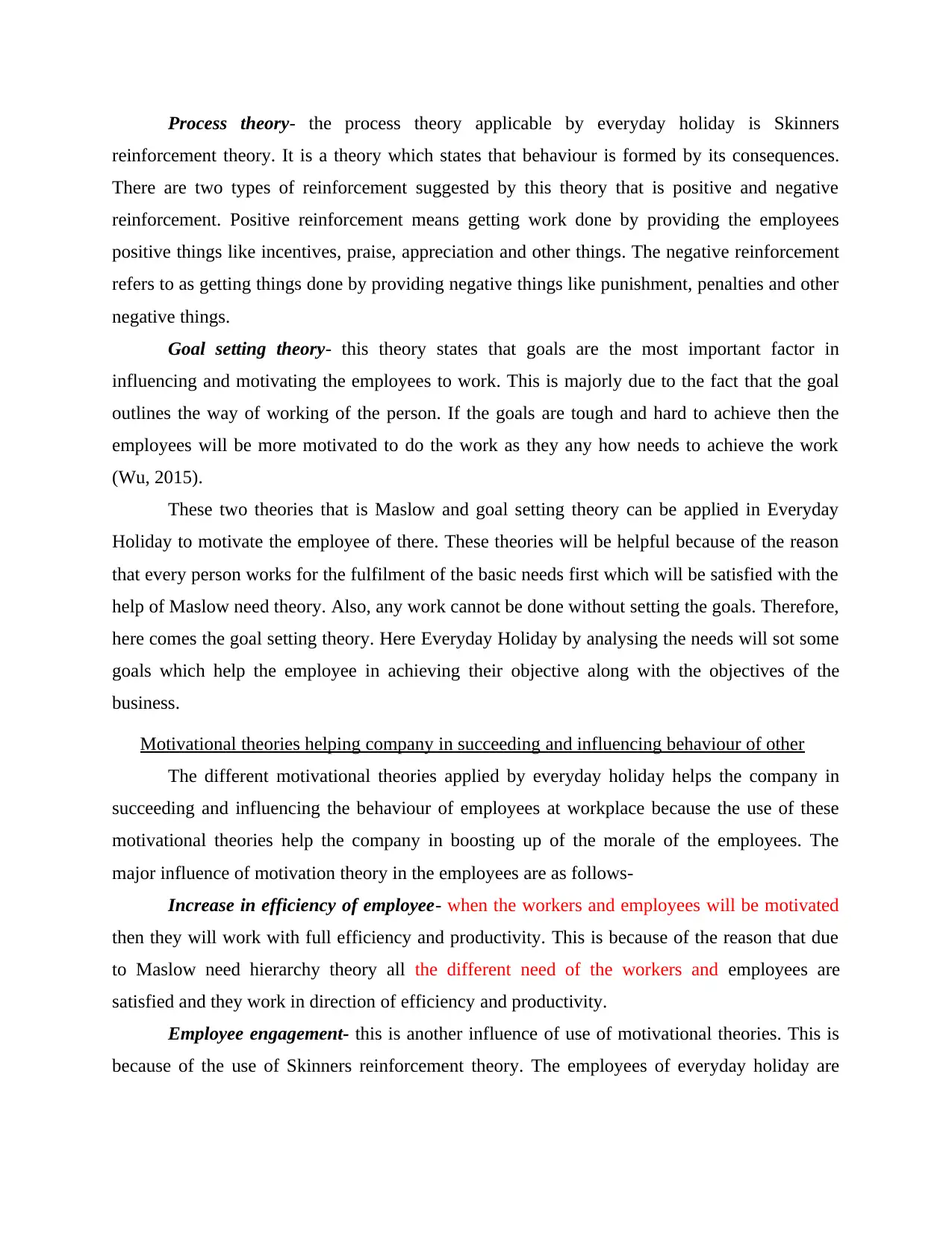
Process theory- the process theory applicable by everyday holiday is Skinners
reinforcement theory. It is a theory which states that behaviour is formed by its consequences.
There are two types of reinforcement suggested by this theory that is positive and negative
reinforcement. Positive reinforcement means getting work done by providing the employees
positive things like incentives, praise, appreciation and other things. The negative reinforcement
refers to as getting things done by providing negative things like punishment, penalties and other
negative things.
Goal setting theory- this theory states that goals are the most important factor in
influencing and motivating the employees to work. This is majorly due to the fact that the goal
outlines the way of working of the person. If the goals are tough and hard to achieve then the
employees will be more motivated to do the work as they any how needs to achieve the work
(Wu, 2015).
These two theories that is Maslow and goal setting theory can be applied in Everyday
Holiday to motivate the employee of there. These theories will be helpful because of the reason
that every person works for the fulfilment of the basic needs first which will be satisfied with the
help of Maslow need theory. Also, any work cannot be done without setting the goals. Therefore,
here comes the goal setting theory. Here Everyday Holiday by analysing the needs will sot some
goals which help the employee in achieving their objective along with the objectives of the
business.
Motivational theories helping company in succeeding and influencing behaviour of other
The different motivational theories applied by everyday holiday helps the company in
succeeding and influencing the behaviour of employees at workplace because the use of these
motivational theories help the company in boosting up of the morale of the employees. The
major influence of motivation theory in the employees are as follows-
Increase in efficiency of employee- when the workers and employees will be motivated
then they will work with full efficiency and productivity. This is because of the reason that due
to Maslow need hierarchy theory all the different need of the workers and employees are
satisfied and they work in direction of efficiency and productivity.
Employee engagement- this is another influence of use of motivational theories. This is
because of the use of Skinners reinforcement theory. The employees of everyday holiday are
reinforcement theory. It is a theory which states that behaviour is formed by its consequences.
There are two types of reinforcement suggested by this theory that is positive and negative
reinforcement. Positive reinforcement means getting work done by providing the employees
positive things like incentives, praise, appreciation and other things. The negative reinforcement
refers to as getting things done by providing negative things like punishment, penalties and other
negative things.
Goal setting theory- this theory states that goals are the most important factor in
influencing and motivating the employees to work. This is majorly due to the fact that the goal
outlines the way of working of the person. If the goals are tough and hard to achieve then the
employees will be more motivated to do the work as they any how needs to achieve the work
(Wu, 2015).
These two theories that is Maslow and goal setting theory can be applied in Everyday
Holiday to motivate the employee of there. These theories will be helpful because of the reason
that every person works for the fulfilment of the basic needs first which will be satisfied with the
help of Maslow need theory. Also, any work cannot be done without setting the goals. Therefore,
here comes the goal setting theory. Here Everyday Holiday by analysing the needs will sot some
goals which help the employee in achieving their objective along with the objectives of the
business.
Motivational theories helping company in succeeding and influencing behaviour of other
The different motivational theories applied by everyday holiday helps the company in
succeeding and influencing the behaviour of employees at workplace because the use of these
motivational theories help the company in boosting up of the morale of the employees. The
major influence of motivation theory in the employees are as follows-
Increase in efficiency of employee- when the workers and employees will be motivated
then they will work with full efficiency and productivity. This is because of the reason that due
to Maslow need hierarchy theory all the different need of the workers and employees are
satisfied and they work in direction of efficiency and productivity.
Employee engagement- this is another influence of use of motivational theories. This is
because of the use of Skinners reinforcement theory. The employees of everyday holiday are
Paraphrase This Document
Need a fresh take? Get an instant paraphrase of this document with our AI Paraphraser
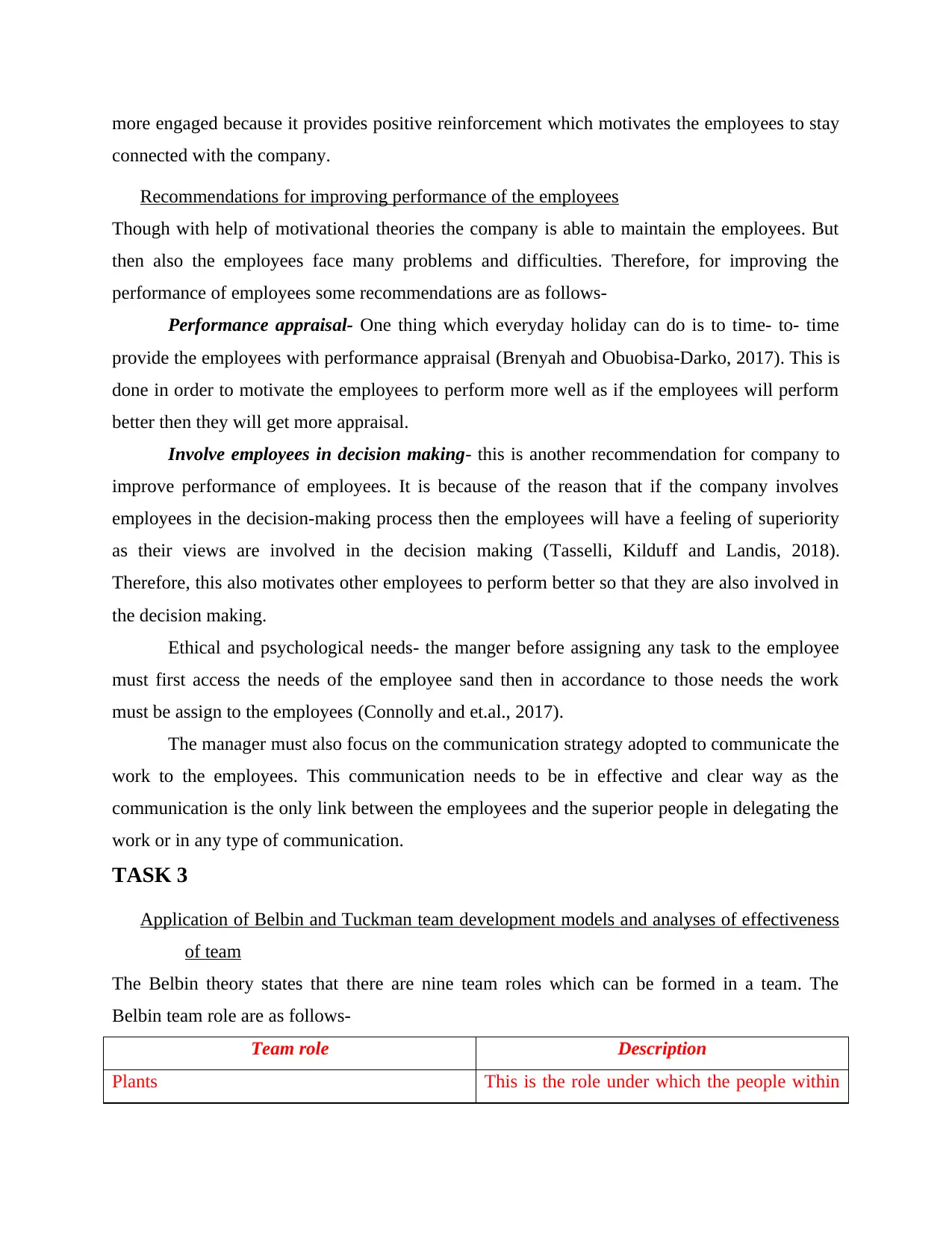
more engaged because it provides positive reinforcement which motivates the employees to stay
connected with the company.
Recommendations for improving performance of the employees
Though with help of motivational theories the company is able to maintain the employees. But
then also the employees face many problems and difficulties. Therefore, for improving the
performance of employees some recommendations are as follows-
Performance appraisal- One thing which everyday holiday can do is to time- to- time
provide the employees with performance appraisal (Brenyah and Obuobisa-Darko, 2017). This is
done in order to motivate the employees to perform more well as if the employees will perform
better then they will get more appraisal.
Involve employees in decision making- this is another recommendation for company to
improve performance of employees. It is because of the reason that if the company involves
employees in the decision-making process then the employees will have a feeling of superiority
as their views are involved in the decision making (Tasselli, Kilduff and Landis, 2018).
Therefore, this also motivates other employees to perform better so that they are also involved in
the decision making.
Ethical and psychological needs- the manger before assigning any task to the employee
must first access the needs of the employee sand then in accordance to those needs the work
must be assign to the employees (Connolly and et.al., 2017).
The manager must also focus on the communication strategy adopted to communicate the
work to the employees. This communication needs to be in effective and clear way as the
communication is the only link between the employees and the superior people in delegating the
work or in any type of communication.
TASK 3
Application of Belbin and Tuckman team development models and analyses of effectiveness
of team
The Belbin theory states that there are nine team roles which can be formed in a team. The
Belbin team role are as follows-
Team role Description
Plants This is the role under which the people within
connected with the company.
Recommendations for improving performance of the employees
Though with help of motivational theories the company is able to maintain the employees. But
then also the employees face many problems and difficulties. Therefore, for improving the
performance of employees some recommendations are as follows-
Performance appraisal- One thing which everyday holiday can do is to time- to- time
provide the employees with performance appraisal (Brenyah and Obuobisa-Darko, 2017). This is
done in order to motivate the employees to perform more well as if the employees will perform
better then they will get more appraisal.
Involve employees in decision making- this is another recommendation for company to
improve performance of employees. It is because of the reason that if the company involves
employees in the decision-making process then the employees will have a feeling of superiority
as their views are involved in the decision making (Tasselli, Kilduff and Landis, 2018).
Therefore, this also motivates other employees to perform better so that they are also involved in
the decision making.
Ethical and psychological needs- the manger before assigning any task to the employee
must first access the needs of the employee sand then in accordance to those needs the work
must be assign to the employees (Connolly and et.al., 2017).
The manager must also focus on the communication strategy adopted to communicate the
work to the employees. This communication needs to be in effective and clear way as the
communication is the only link between the employees and the superior people in delegating the
work or in any type of communication.
TASK 3
Application of Belbin and Tuckman team development models and analyses of effectiveness
of team
The Belbin theory states that there are nine team roles which can be formed in a team. The
Belbin team role are as follows-
Team role Description
Plants This is the role under which the people within
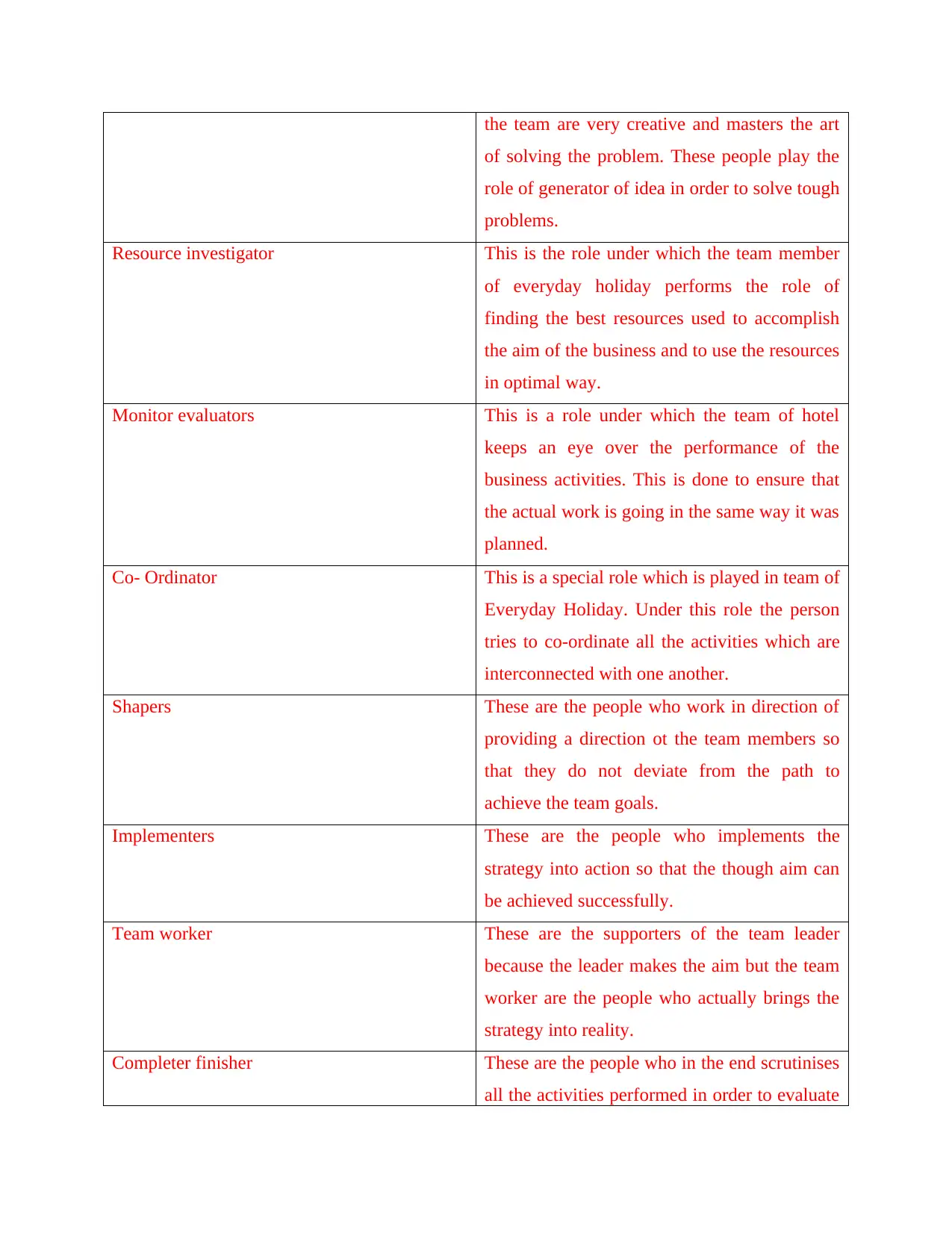
the team are very creative and masters the art
of solving the problem. These people play the
role of generator of idea in order to solve tough
problems.
Resource investigator This is the role under which the team member
of everyday holiday performs the role of
finding the best resources used to accomplish
the aim of the business and to use the resources
in optimal way.
Monitor evaluators This is a role under which the team of hotel
keeps an eye over the performance of the
business activities. This is done to ensure that
the actual work is going in the same way it was
planned.
Co- Ordinator This is a special role which is played in team of
Everyday Holiday. Under this role the person
tries to co-ordinate all the activities which are
interconnected with one another.
Shapers These are the people who work in direction of
providing a direction ot the team members so
that they do not deviate from the path to
achieve the team goals.
Implementers These are the people who implements the
strategy into action so that the though aim can
be achieved successfully.
Team worker These are the supporters of the team leader
because the leader makes the aim but the team
worker are the people who actually brings the
strategy into reality.
Completer finisher These are the people who in the end scrutinises
all the activities performed in order to evaluate
of solving the problem. These people play the
role of generator of idea in order to solve tough
problems.
Resource investigator This is the role under which the team member
of everyday holiday performs the role of
finding the best resources used to accomplish
the aim of the business and to use the resources
in optimal way.
Monitor evaluators This is a role under which the team of hotel
keeps an eye over the performance of the
business activities. This is done to ensure that
the actual work is going in the same way it was
planned.
Co- Ordinator This is a special role which is played in team of
Everyday Holiday. Under this role the person
tries to co-ordinate all the activities which are
interconnected with one another.
Shapers These are the people who work in direction of
providing a direction ot the team members so
that they do not deviate from the path to
achieve the team goals.
Implementers These are the people who implements the
strategy into action so that the though aim can
be achieved successfully.
Team worker These are the supporters of the team leader
because the leader makes the aim but the team
worker are the people who actually brings the
strategy into reality.
Completer finisher These are the people who in the end scrutinises
all the activities performed in order to evaluate
⊘ This is a preview!⊘
Do you want full access?
Subscribe today to unlock all pages.

Trusted by 1+ million students worldwide
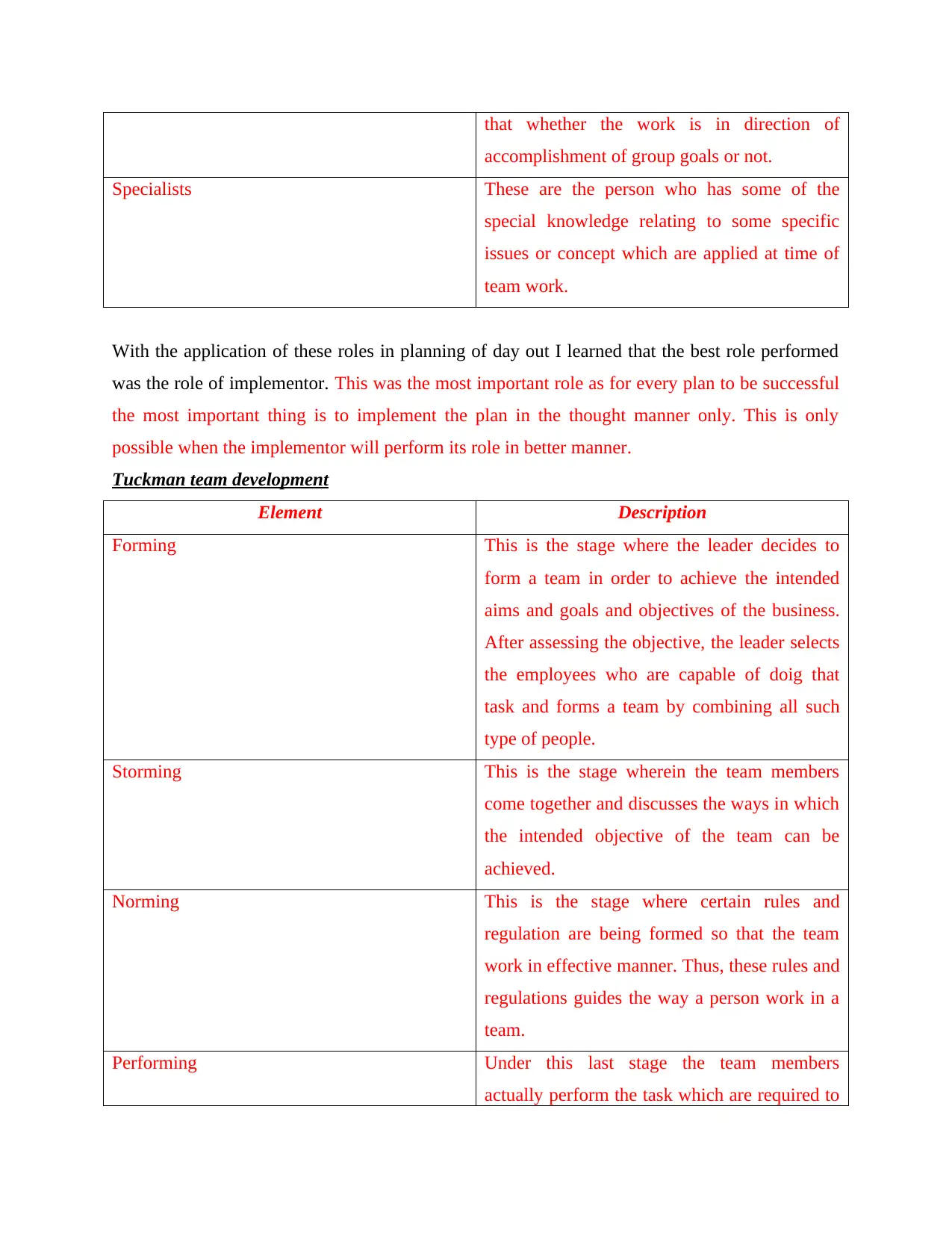
that whether the work is in direction of
accomplishment of group goals or not.
Specialists These are the person who has some of the
special knowledge relating to some specific
issues or concept which are applied at time of
team work.
With the application of these roles in planning of day out I learned that the best role performed
was the role of implementor. This was the most important role as for every plan to be successful
the most important thing is to implement the plan in the thought manner only. This is only
possible when the implementor will perform its role in better manner.
Tuckman team development
Element Description
Forming This is the stage where the leader decides to
form a team in order to achieve the intended
aims and goals and objectives of the business.
After assessing the objective, the leader selects
the employees who are capable of doig that
task and forms a team by combining all such
type of people.
Storming This is the stage wherein the team members
come together and discusses the ways in which
the intended objective of the team can be
achieved.
Norming This is the stage where certain rules and
regulation are being formed so that the team
work in effective manner. Thus, these rules and
regulations guides the way a person work in a
team.
Performing Under this last stage the team members
actually perform the task which are required to
accomplishment of group goals or not.
Specialists These are the person who has some of the
special knowledge relating to some specific
issues or concept which are applied at time of
team work.
With the application of these roles in planning of day out I learned that the best role performed
was the role of implementor. This was the most important role as for every plan to be successful
the most important thing is to implement the plan in the thought manner only. This is only
possible when the implementor will perform its role in better manner.
Tuckman team development
Element Description
Forming This is the stage where the leader decides to
form a team in order to achieve the intended
aims and goals and objectives of the business.
After assessing the objective, the leader selects
the employees who are capable of doig that
task and forms a team by combining all such
type of people.
Storming This is the stage wherein the team members
come together and discusses the ways in which
the intended objective of the team can be
achieved.
Norming This is the stage where certain rules and
regulation are being formed so that the team
work in effective manner. Thus, these rules and
regulations guides the way a person work in a
team.
Performing Under this last stage the team members
actually perform the task which are required to
Paraphrase This Document
Need a fresh take? Get an instant paraphrase of this document with our AI Paraphraser
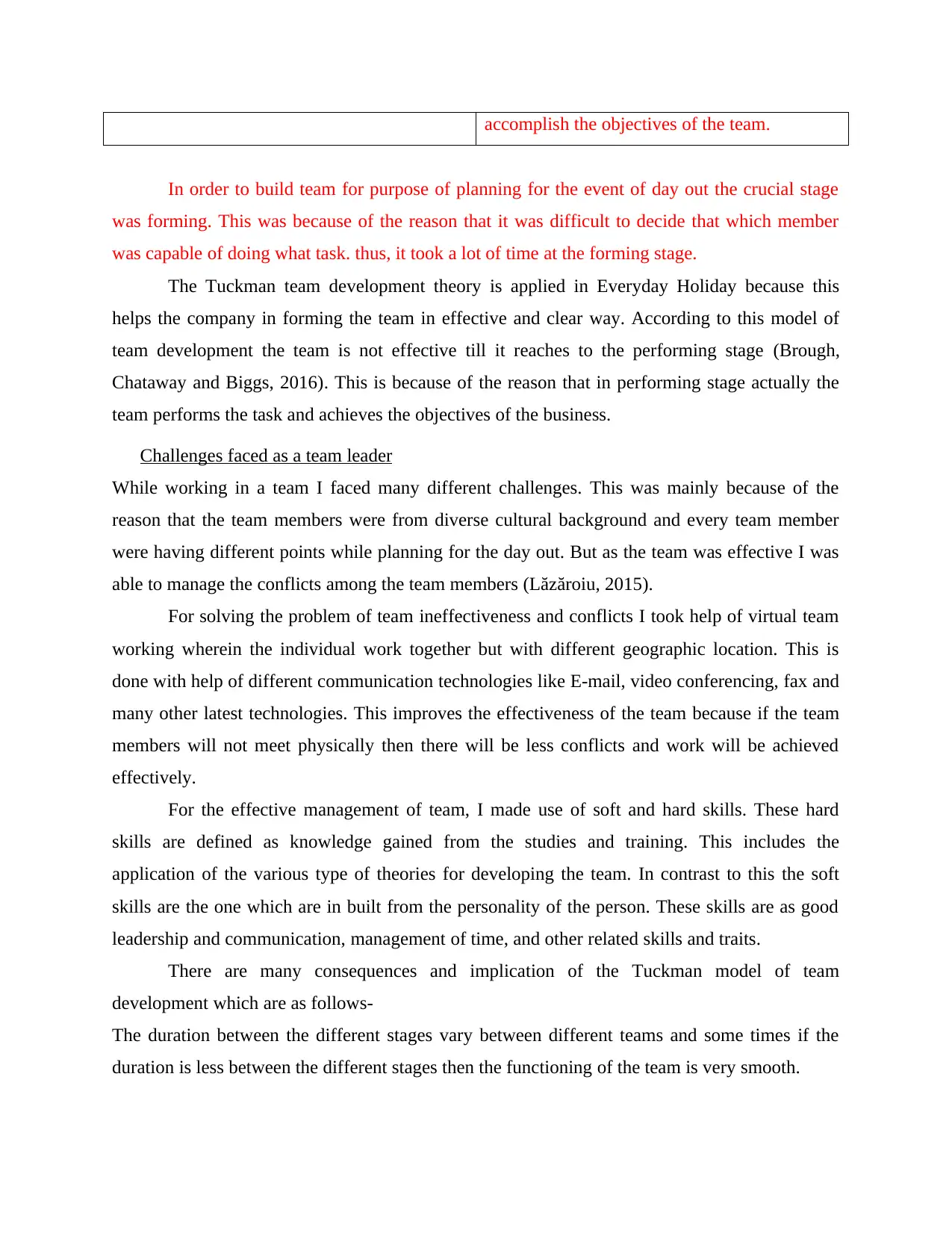
accomplish the objectives of the team.
In order to build team for purpose of planning for the event of day out the crucial stage
was forming. This was because of the reason that it was difficult to decide that which member
was capable of doing what task. thus, it took a lot of time at the forming stage.
The Tuckman team development theory is applied in Everyday Holiday because this
helps the company in forming the team in effective and clear way. According to this model of
team development the team is not effective till it reaches to the performing stage (Brough,
Chataway and Biggs, 2016). This is because of the reason that in performing stage actually the
team performs the task and achieves the objectives of the business.
Challenges faced as a team leader
While working in a team I faced many different challenges. This was mainly because of the
reason that the team members were from diverse cultural background and every team member
were having different points while planning for the day out. But as the team was effective I was
able to manage the conflicts among the team members (Lăzăroiu, 2015).
For solving the problem of team ineffectiveness and conflicts I took help of virtual team
working wherein the individual work together but with different geographic location. This is
done with help of different communication technologies like E-mail, video conferencing, fax and
many other latest technologies. This improves the effectiveness of the team because if the team
members will not meet physically then there will be less conflicts and work will be achieved
effectively.
For the effective management of team, I made use of soft and hard skills. These hard
skills are defined as knowledge gained from the studies and training. This includes the
application of the various type of theories for developing the team. In contrast to this the soft
skills are the one which are in built from the personality of the person. These skills are as good
leadership and communication, management of time, and other related skills and traits.
There are many consequences and implication of the Tuckman model of team
development which are as follows-
The duration between the different stages vary between different teams and some times if the
duration is less between the different stages then the functioning of the team is very smooth.
In order to build team for purpose of planning for the event of day out the crucial stage
was forming. This was because of the reason that it was difficult to decide that which member
was capable of doing what task. thus, it took a lot of time at the forming stage.
The Tuckman team development theory is applied in Everyday Holiday because this
helps the company in forming the team in effective and clear way. According to this model of
team development the team is not effective till it reaches to the performing stage (Brough,
Chataway and Biggs, 2016). This is because of the reason that in performing stage actually the
team performs the task and achieves the objectives of the business.
Challenges faced as a team leader
While working in a team I faced many different challenges. This was mainly because of the
reason that the team members were from diverse cultural background and every team member
were having different points while planning for the day out. But as the team was effective I was
able to manage the conflicts among the team members (Lăzăroiu, 2015).
For solving the problem of team ineffectiveness and conflicts I took help of virtual team
working wherein the individual work together but with different geographic location. This is
done with help of different communication technologies like E-mail, video conferencing, fax and
many other latest technologies. This improves the effectiveness of the team because if the team
members will not meet physically then there will be less conflicts and work will be achieved
effectively.
For the effective management of team, I made use of soft and hard skills. These hard
skills are defined as knowledge gained from the studies and training. This includes the
application of the various type of theories for developing the team. In contrast to this the soft
skills are the one which are in built from the personality of the person. These skills are as good
leadership and communication, management of time, and other related skills and traits.
There are many consequences and implication of the Tuckman model of team
development which are as follows-
The duration between the different stages vary between different teams and some times if the
duration is less between the different stages then the functioning of the team is very smooth.
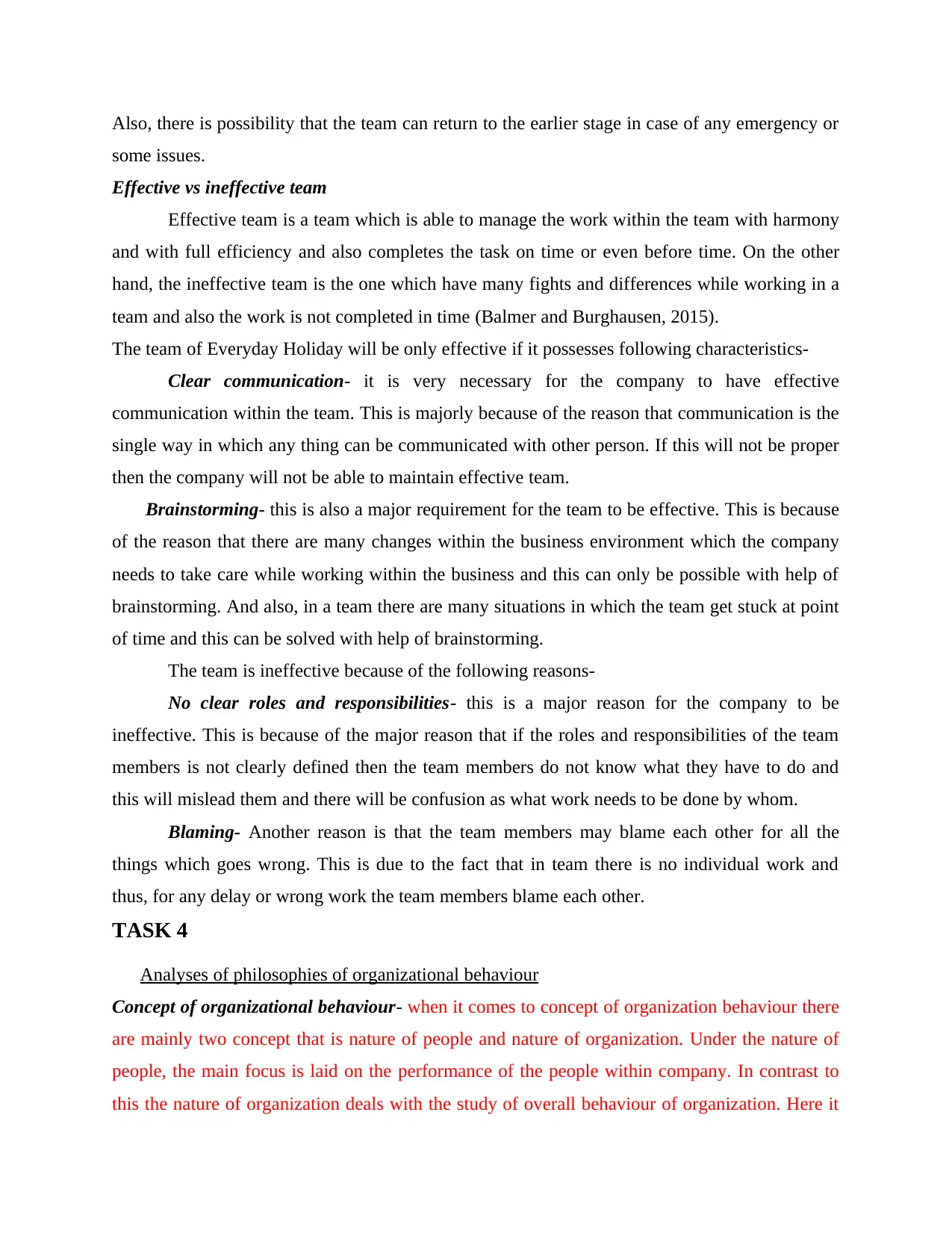
Also, there is possibility that the team can return to the earlier stage in case of any emergency or
some issues.
Effective vs ineffective team
Effective team is a team which is able to manage the work within the team with harmony
and with full efficiency and also completes the task on time or even before time. On the other
hand, the ineffective team is the one which have many fights and differences while working in a
team and also the work is not completed in time (Balmer and Burghausen, 2015).
The team of Everyday Holiday will be only effective if it possesses following characteristics-
Clear communication- it is very necessary for the company to have effective
communication within the team. This is majorly because of the reason that communication is the
single way in which any thing can be communicated with other person. If this will not be proper
then the company will not be able to maintain effective team.
Brainstorming- this is also a major requirement for the team to be effective. This is because
of the reason that there are many changes within the business environment which the company
needs to take care while working within the business and this can only be possible with help of
brainstorming. And also, in a team there are many situations in which the team get stuck at point
of time and this can be solved with help of brainstorming.
The team is ineffective because of the following reasons-
No clear roles and responsibilities- this is a major reason for the company to be
ineffective. This is because of the major reason that if the roles and responsibilities of the team
members is not clearly defined then the team members do not know what they have to do and
this will mislead them and there will be confusion as what work needs to be done by whom.
Blaming- Another reason is that the team members may blame each other for all the
things which goes wrong. This is due to the fact that in team there is no individual work and
thus, for any delay or wrong work the team members blame each other.
TASK 4
Analyses of philosophies of organizational behaviour
Concept of organizational behaviour- when it comes to concept of organization behaviour there
are mainly two concept that is nature of people and nature of organization. Under the nature of
people, the main focus is laid on the performance of the people within company. In contrast to
this the nature of organization deals with the study of overall behaviour of organization. Here it
some issues.
Effective vs ineffective team
Effective team is a team which is able to manage the work within the team with harmony
and with full efficiency and also completes the task on time or even before time. On the other
hand, the ineffective team is the one which have many fights and differences while working in a
team and also the work is not completed in time (Balmer and Burghausen, 2015).
The team of Everyday Holiday will be only effective if it possesses following characteristics-
Clear communication- it is very necessary for the company to have effective
communication within the team. This is majorly because of the reason that communication is the
single way in which any thing can be communicated with other person. If this will not be proper
then the company will not be able to maintain effective team.
Brainstorming- this is also a major requirement for the team to be effective. This is because
of the reason that there are many changes within the business environment which the company
needs to take care while working within the business and this can only be possible with help of
brainstorming. And also, in a team there are many situations in which the team get stuck at point
of time and this can be solved with help of brainstorming.
The team is ineffective because of the following reasons-
No clear roles and responsibilities- this is a major reason for the company to be
ineffective. This is because of the major reason that if the roles and responsibilities of the team
members is not clearly defined then the team members do not know what they have to do and
this will mislead them and there will be confusion as what work needs to be done by whom.
Blaming- Another reason is that the team members may blame each other for all the
things which goes wrong. This is due to the fact that in team there is no individual work and
thus, for any delay or wrong work the team members blame each other.
TASK 4
Analyses of philosophies of organizational behaviour
Concept of organizational behaviour- when it comes to concept of organization behaviour there
are mainly two concept that is nature of people and nature of organization. Under the nature of
people, the main focus is laid on the performance of the people within company. In contrast to
this the nature of organization deals with the study of overall behaviour of organization. Here it
⊘ This is a preview!⊘
Do you want full access?
Subscribe today to unlock all pages.

Trusted by 1+ million students worldwide
1 out of 16
Related Documents
Your All-in-One AI-Powered Toolkit for Academic Success.
+13062052269
info@desklib.com
Available 24*7 on WhatsApp / Email
![[object Object]](/_next/static/media/star-bottom.7253800d.svg)
Unlock your academic potential
Copyright © 2020–2026 A2Z Services. All Rights Reserved. Developed and managed by ZUCOL.





